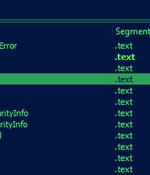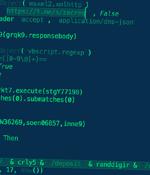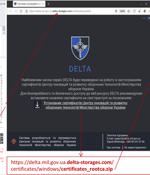Security News

The Russian hacking group known as 'Nodaria' is using a new information-stealing malware called 'Graphiron' to steal data from Ukrainian organizations. Symantec's threat research team discovered that Nodaria has been using Graphiron in attacks since at least October 2022 through mid-January 2023.

The Russia-affiliated Sandworm used yet another wiper malware strain dubbed NikoWiper as part of an attack that took place in October 2022 targeting an energy sector company in Ukraine. The use of SDelete is notable, as it suggests that Sandworm has been experimenting with the utility as a wiper in at least two different instances to cause irrevocable damage to the targeted organizations in Ukraine.

In brief Russian hackers have proved yet again how quickly cyber attacks can be used to respond to global events with a series of DDoS attacks on German infrastructure and government websites in response to the country's plan to send tanks to Ukraine. Germany announced the transfer of 14 Leopard 2 A6 tanks to Ukraine on Wednesday, jointly with the US saying it would send 31 M1 Abrams tanks to the besieged nation.

Ukraine has come under a fresh cyber onslaught from Russia that involved the deployment of a previously undocumented Golang-based data wiper dubbed SwiftSlicer. ESET attributed the attack to Sandworm, a nation-state group linked to Military Unit 74455 of the Main Intelligence Directorate of the General Staff of the Armed Forces of the Russian Federation.

The Ukrainian Computer Emergency Response Team found a cocktail of five different data-wiping malware strains deployed on the network of the country's national news agency on January 17th. "As of January 27, 2023, 5 samples of malicious programs were detected, the functionality of which is aimed at violating the integrity and availability of information," CERT-UA said. Their attempt to wipe out all the data on the news agency's systems failed.

The Russian state-sponsored cyber espionage group known as Gamaredon has continued its digital onslaught against Ukraine, with recent attacks leveraging the popular messaging app Telegram to strike military and law enforcement sectors in the country. "The Gamaredon group's network infrastructure relies on multi-stage Telegram accounts for victim profiling and confirmation of geographic location, and then finally leads the victim to the next stage server for the final payload," the BlackBerry Research and Intelligence Team said in a report shared with The Hacker News.

The Computer Emergency Response Team of Ukraine has linked a destructive malware attack targeting the country's National News Agency of Ukraine to Sandworm Russian military hackers. "According to preliminary data, provided by CERT-UA specialists, the attack have caused certain destructive effects on the agency's information infrastructure, but the threat has been swiftly localized nonetheless," the State Service of Special Communications and Information Protection of Ukraine said.

This picture comes from the Ukraine Cyber Police, who raided a fraudulent call centre just before New Year, where they say the three founders of the scam, plus 37 "Staff", were busted for allegedly operating a large-scale banking fraud. Typically, the scammers try to convince you that your bank account is under attack from fraudsters, and patiently offer to help you "Secure" your account and "Recover" lost or at-risk funds.

"You still have a lot of soldiers bringing cellphones to the frontline who want to talk to their families and they are either being intercepted as they go through a Ukrainian telecommunications provider or intercepted over the air," said Alperovitch. "That doesn't pose too much difficulty for the Ukrainian security services."

The Computer Emergency Response Team of Ukraine this week disclosed that users of the Delta situational awareness program received phishing emails from a compromised email account belonging to the Ministry of Defense. The attacks, which have been attributed to a threat cluster dubbed UAC-0142, aimed to infect systems with two pieces of data-stealing malware referred to as FateGrab and StealDeal.